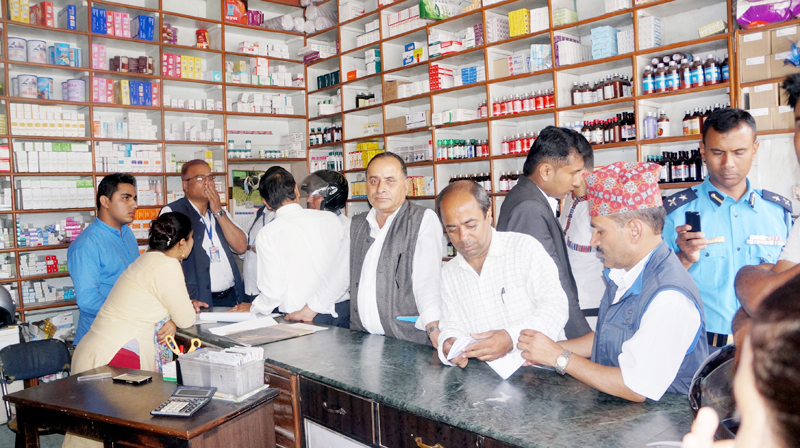Consumers deprived of their rights due to lax market monitoring
KATHMANDU, NOVEMBER 4
Due to ineffective market inspections, lack of consumer awareness and increasing number of dishonest traders, violation of consumer rights is continually on the rise in the domestic market.
Of the 954 firms that were inspected by the Department of Commerce, Supply and Consumer Protection (DoCSCP) from mid-July to October 29 this year, 197 firms were levied fines worth Rs 9.02 million and 24 firms were sealed. Meanwhile, a total of 584 firms were inspected in the first four months (mid-July to mid-November) of the previous fiscal year, among which 208 firms were fined Rs 3.53 million and 49 firms were sealed.
These are but just a representative number of the market anomalies which have come to light even with the limited number of market monitoring activities and defiant traders are likely to continue deceiving consumers even after being inspected as inspection is sporadic.
For instance, 42-year-old Radha Shrestha from Balaju, says that she does not feel like she is being cheated when buying daily essentials but is sceptical when buying clothing items. She mentions that if one can bargain hard then they are offered cheaper rates or else traders tend to charge high.
Stating that the government’s market monitoring is just a farce, she says that traders get back to their normal ways from the very next day the monitoring has been conducted. “The amount that the government fines the fraudulent traders is very low, so they do not mind paying the fine and swindling buyers again,” Shrestha complains.
She feels that the fines need to be increased significantly and traders who are found cheating consumers should not be allowed to engage in the same business. “Then only will there be some order in the market.”
Similarly, Ram Chandra Thapa, 28, from Ason, states that ethical business practices do not exist in Nepal. “For example, consumers during this pandemic are being cheated while buying medical products,” he says. “It is time to raise awareness among customers and develop ethics among traders.”
Another consumer Srijan Upreti, 29, from Chabahil, mentions that consumers are more likely to be deceived when they buy products in remote areas than in a competitive urban market. “The availability of fixed price shops and online shopping sites where the price of the product is clearly mentioned has decreased the chances of people being swindled in urban areas in recent days,” he says. However, he feels that in cities consumers get cheated when availing services. “I had taken my refrigerator for repair and later realised I had been charged a high amount,” he shares.
He too states that market monitoring activities are done just for formality.
“The regulatory authorities are not performing to their fullest capacity,” he says, adding that at least the quality of food products should be monitored as it is directly related to the health of consumers.
“I would not say that we have been able to bring about sea changes but when we do penalise dishonest traders consumers should be aware of such business people,” says Netra Prasad Subedi, director general of DoCSCP. Acknowledging that market monitoring has not been as effective as expected as there are many repeat offenders, he says there is a need for a comprehensive analysis to usher in healthy market practices.
As per consumer rights activists, due to lack of stringent monitoring, customers have not been able to enjoy their rights.
“Violation of consumer rights is on the rise and people are being deceived in terms of price, quality and quantity.
The poor implementation of regulations is to be blamed for this,” says Madhav Timalsina, president of Consumer Rights Investigation Forum. “Fraudulent traders are thriving in the market as regulatory bodies do not have enough resources to conduct frequent market monitoring,” he adds.
He further says that the constitution has given local governments the power to regulate the market. However, due to the unwillingness of local governments to take that responsibility, consumers have not been able to benefit from their rights,” he explains. He states that local level market monitoring mechanism must be strengthened.
Meanwhile, Rabindra Acharya, director of DoCSCP, informs that the department has appointed market inspection officers at the District Administrative Offices of all 77 districts. “We are training them and once all local governments start regulating their respective markets there will be a healthier market.”






